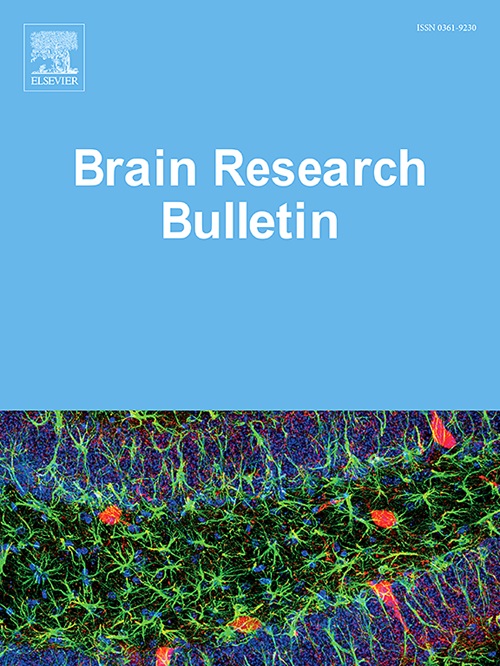Th17/Treg平衡在黄芪多糖通过微生物-肠-脑轴抑制实验性自身免疫性脑脊髓炎的过程中受到调节。
IF 3.5
3区 医学
Q2 NEUROSCIENCES
引用次数: 0
摘要
Th17/Treg失衡是多发性硬化症(MS)免疫细胞浸润中枢神经系统(CNS)的重要原因。肠道菌群影响肠道和远端区域(如中枢神经系统)Th17/Treg平衡,进一步促进MS的发生和进展。我们前期研究表明黄芪多糖(黄芪多糖)具有减轻实验性自身免疫性脑脊髓炎(EAE)小鼠临床症状和脱髓鞘的作用,这是MS的经典模型。然而,其作用机制尚不完全清楚。本研究发现,黄芪多糖可抑制EAE小鼠中枢神经系统和外周血中炎症反应,调节Th17/Treg平衡。进一步表明,APS可抑制肠道炎症,降低Th17功能。通过干预肠道菌群的鸡尾酒抗生素实验证明,APS通过调节肠道菌群减轻EAE。通过16S rRNA测序,我们发现APS可以调节EAE小鼠肠道微生物群的多样性和组成。然后,我们发现APS调节粪便和血浆中的代谢物组成,从而改变肠道和血液代谢功能。与该途径相关的代谢物,包括鞘氨醇1磷酸(S1P)、前列腺素E2 (PGE2)、ADP和ATP,被APS下调。黄芪多糖可上调胆汁酸代谢物牛磺鹅脱氧胆酸-7-硫酸酯和n -棕榈酰天冬氨酸水平。综上所述,我们的研究表明,APS通过调节肠道菌群组成,影响代谢物组成,改善外周血和中枢神经系统中Th17/Treg平衡,对EAE具有抑制作用。本文章由计算机程序翻译,如有差异,请以英文原文为准。
Th17/Treg balance is regulated during the suppression of experimental autoimmune encephalomyelitis treated by Astragalus polysaccharides via the microbiota-gut-brain axis
The Th17/Treg imbalance is an important cause of immune cell infiltration into the central nervous system (CNS) in multiple sclerosis (MS). The gut microbiota affects the Th17/Treg balance in the gut and in distal areas, such as the CNS, which further contributes to the onset and progression of MS. Our previous studies have shown that Astragalus polysaccharide (APS) has a role in alleviating the clinical symptoms and demyelination of experimental autoimmune encephalomyelitis (EAE) mice, a classic MS model. However, the mechanism of action is not fully understood. In this study, we found that APS suppressed inflammation and regulated the Th17/Treg balance in the CNS and peripheral blood of EAE mice. It was further shown that APS inhibited gut inflammation and reduced Th17 function. The experiment with an antibiotic cocktail interfering with the gut microbiota proved that APS alleviated EAE by regulating the gut microbiota. Through 16S rRNA sequencing, we showed that APS regulated gut microbiota diversity and composition in EAE mice. Then, we found that APS regulated metabolite composition in feces and plasma, thus altering gut and blood metabolic functions. Metabolites related to this pathway, including sphingosine 1 phosphate (S1P), prostaglandin E2 (PGE2), ADP, and ATP, were downregulated by APS. The levels of bile acid metabolites such as taurochenodeoxycholate-7-sulfate and N-palmitoyl aspartic acid were upregulated by APS. In summary, our study demonstrated that APS exerts a suppressive effect on EAE by regulating gut microbiota composition, affecting metabolite composition, and improving the Th17/Treg balance in the peripheral blood and CNS.
求助全文
通过发布文献求助,成功后即可免费获取论文全文。
去求助
来源期刊

Brain Research Bulletin
医学-神经科学
CiteScore
6.90
自引率
2.60%
发文量
253
审稿时长
67 days
期刊介绍:
The Brain Research Bulletin (BRB) aims to publish novel work that advances our knowledge of molecular and cellular mechanisms that underlie neural network properties associated with behavior, cognition and other brain functions during neurodevelopment and in the adult. Although clinical research is out of the Journal''s scope, the BRB also aims to publish translation research that provides insight into biological mechanisms and processes associated with neurodegeneration mechanisms, neurological diseases and neuropsychiatric disorders. The Journal is especially interested in research using novel methodologies, such as optogenetics, multielectrode array recordings and life imaging in wild-type and genetically-modified animal models, with the goal to advance our understanding of how neurons, glia and networks function in vivo.
 求助内容:
求助内容: 应助结果提醒方式:
应助结果提醒方式:


